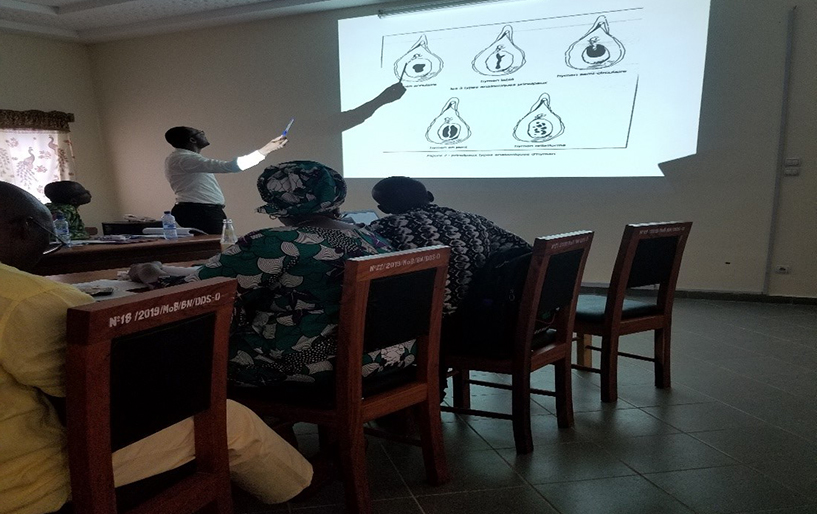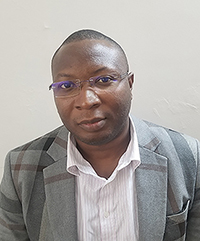Leading Voices: Effectively Supporting Gender-Based Violence Survivors in Benin
Leading Voices: Effectively Supporting Gender-Based Violence Survivors in Benin


Meet Dr. Omer Adjibode, Gender-Based Violence (GBV) Advisor for the USAID-funded Integrated Health Services Activity (IHSA) in Benin. The purpose of IHSA is to strengthen local capacity for the delivery of high-impact malaria, family planning, maternal and child health (MCH), and GBV services with strong citizen engagement to reduce maternal, newborn, child, and adolescent girls’ mortality and morbidity.
In his role, Omer is responsible for defining strategies to improve care for GBV survivors. In this issue of Leading Voices, he talks about the virtual One Stop GBV center, an innovative resource for GBV survivors in Benin. According to national legislation in Benin, “GBV includes physical, moral, sexual or psychological violence, female genital mutilation, forced or arranged marriages, “honour” crimes and other practices harmful to women.”
Can you tell us more about how GBV is addressed in Benin? What are the key components of successful strategies or, on the contrary, some areas for improvement?
In Benin, GBV survivors can access an integrated package of care by visiting one of the country’s One Stop GBV centers, located in the cities of Cotonou, Parakou, and Abomey. These centers provide free and integrated (medical, psychological, and legal) services to people (mostly women) who have experienced GBV.
However, GBV survivors who live in other regions are unable to access these services due to financial and other barriers. For those who do seek care, they do so either at police stations, centres de promotion sociale (CPS)(community development centers), or at health facilities where they often don’t receive the specific care they require, including fully confidential services and counseling. Often survivors have to pay for these partial services, which is an additional and important barrier to receiving treatment.
How are these gaps addressed?
To help increase GBV survivors’ access to care, the direction de la Santé de la Mère et de l’Enfant (DSME), with technical input from IHSA, developed a model to provide integrated care for GBV survivors in areas not covered by the three existing One Stop centers. Through a pilot project in the department of Ouémé, IHSA supported the DSME to create and launch the first virtual One Stop GBV center, which is hosted in a regular health facility and run by existing health facility staff specifically trained to work with GBV survivors. These facilities are set up to provide confidential and holistic GBV prevention, treatment, and psychosocial support services, according to national protocols. The psychosocial support is provided by social workers, women when possible, while legal support is provided by police officers.
At the virtual centers, general practitioners provide an integrated package of treatment services identical to the package provided at the central One Stop GBV centers. IHSA staff have these practitioners trained on GBV case management in accordance with national guidelines, in collaboration with the direction départementale de la Santé de l’Ouémé, the direction départementale des Affaires sociales de l’Ouémé, and the direction départementale de la police républicaine de l’Ouémé.
Can you describe the role of IHSA?
As a first step, and with technical input from IHSA, last April, the DSME developed and validated a concept note describing the approach and methodology of the virtual One Stop center at a multi-stakeholder workshop. Through this workshop, key stakeholders reviewed the steps for its implementation and potential scale-up. The workshop was a key opportunity to seek buy-in from the medical staff, social workers, and legal actors who would be providing services to GBV survivors at the center.
As a next step, DSME facilitators organized trainings on the integrated support model for GBV survivors in each health zone of Ouémé for small teams of health care workers and social workers, who subsequently oriented other personnel in their respective health zones on this integrated model. These teams were oriented on the use of GBV data collection tools to gather statistics on GBV survivor services, ensuring client confidentiality. These trainings were well-received: Sigrade Goudjo, a social worker at the CPS of Sèmè-Podji, says, “The virtual One Stop GBV center is a way to foster collaboration between the different existing actors. It takes into account the care of GBV survivors in an integrated way.”
What did the first results show?
The initial results in Ouémé were very promising. A total of 264 health care providers (19 doctors, 106 midwives, and 139 nurses), 48 social workers, and 71 law enforcement officers in the department of Ouémé were trained June to August 2019 on standard operating procedures for treatment of GBV survivors and demonstrated improved understanding of these procedures.
Because of this successful initial orientation of a substantial multi-sectoral team, the model is being launched quickly and effectively. In the Adjohoun-Bonou-Dangbo health zone, it is now possible to obtain monthly statistics (disaggregated by age group, gender, and type of GBV) on the type of care provided to survivors of GBV.
What are the next steps?
The next step will be to develop and roll out a new model to support the reintegration of GBV survivors, including of those who’ve received services through the One Stop center. Three models are under discussion: the first model focuses on strengthening the “national relief system” at the departmental level. The Beninese State, through the direction départementale des Affaires sociales provides financial aid to vulnerable groups on a case-by-case basis. Unfortunately, since the availability of financial support is limited and not specific to GBV survivors, they rarely benefit from it (6.25% of beneficiaries in 2018 were GBV survivors in Ouémé).
The second model is based on providing GBV survivors with viable opportunities to find work in professional groups or associations. Specialists in income generation and CPS social workers have already developed a list of groups engaged in manioc processing, palm oil extraction, and soy harvesting, which could fit this profile.
The third model focuses on creating a support system to help survivors with the required skills and training to find opportunities in the private sector. This model will also be informed by evidence and global best practices.
The objective of the Ministry of Health is to improve the care provided to GBV survivors with technical support from IHSA and to increase survivors access to quality care. To eliminate transport barriers, the virtual One Stop GBV center is a promising model that can be scaled up to meet unmet needs in underserved areas. As described by Dr. Alabi Abdias, médecin chef of Dangbo, “The virtual One Stop GBV center is an effective way to integrate GBV survivors’ care into general health care. This solution is beneficial to both survivors and the State.”